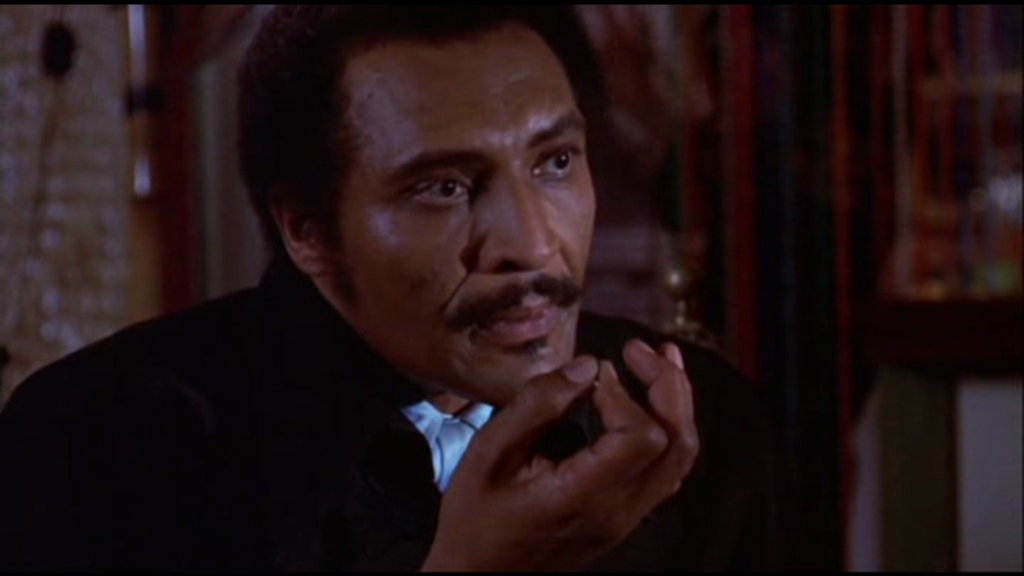I have to admit, I haven't watched many blaxploitation films; I've mainly read about them in film theory books. I know about their problematic nature, the fact that they often reinforce harmful stereotypes, and that Quentin Tarantino loves them beyond all reason. And when it comes to Blacula, the most I knew about it was (1) it was a blaxsploitation film and (2) it was a punchline in The Venture Bros.
Therefore I was really surprised that I found Blacula to be............. good. Like actually enjoyably good. But that's getting a little ahead of ourselves.
The main plot of the movie starts when an African prince journeys with his wife to Transylvania to meet with the noble Count Dracula, hoping for his help in trade/race/national relations. There, Dracula gives a speech that Leonardo Dicaprio seems to have tried to channel for Django Unchained, only Dracula is far, far more racist.
When Racist-Dracula asks to bang the African prince's wife out of morbid curiosity, the African prince feels (rightly) insulted by Dracula's entitlement/racism/overall horribleness and tries to leave. Dracula, however, near-kills him, turns him into a vampire, locks him in a coffin, and traps his wife inside a tomb with that coffin so that she'll starve to death, all for "insulting" him, the great Count Dracula. ("Dude, you were the one who insulted him!" surely we all want to scream at our televisions.) And then Dracula proclaims his "curse" on the Black Prince of Africa; he will not only be cursed with vampirism, but with Dracula's own name. "From now on," he proclaims, "you will be known as.... Blacula."
I was ready for the whole film to be this horrifyingly cheesy, but then the film cuts forward to what was (at the time) "modern day" and surprisingly the 1970s actually add some class to this film. The awakening of, ugh, "Blacula" begins similarly to a Hammer Dracula film, with unknowing citizens disturbing Dracula's coffin. However, in this movie they're... a gay antiquing couple???
.avi_snapshot_00.15.11_%5B2013.06.22_20.29.11%5D.jpg) |
| Seen here about to get vampired |
I'm sorry... my brain just broke.
So Blacula wakes up and feeds off of the couple, accidentally turning them into vampires. He then stops being blood crazed (because apparently hundreds of years of imprisonment and starvation are shrugged off after a quick snack) and goes to hunt for his long lost wife. Who... apparently has been reincarnated or something? Just go with it.
And, thankfully, from then on the name 'Blacula' is NEVER USED. He instead is called by his original/princely name: Manuwalde.
Now, in the documentary White Scripts and Black Supermen, it is mentioned that there have traditionally (especially in the '60s and '70s) been two characterizations of black men: Shaft or Sidney Poitier (for comic book fans, this can also be substituted with 'Luke Cage or Black Panther'). Essentially, a black protagonist is either a cold-and-dangerous badass, or he is a calm and dignified (and often near saintly) gentleman. The odd thing is that Manuwalde, aka Blacula, is actually the Poitier-type. He's respectful, honorable, and just not all that threatening for a vampire.
For example, when he finally does find his reincarnated wife, he doesn't bite her to turn her into a vampire, but instead reveals his story and just woos her, saying at one point: "I will not take you by force." Which is odd because, well, that's typically what vampires DO. But Manuwalde is above all that; his princely nature and honor seem to most of the time outweigh his vampirism. Unlike other vampires, he also doesn't seem all that "sexual." When his new love agrees to be "his," I expected a passion-fueled kiss. Instead, they embrace in one of the chastest hugs I've ever seen put to film.
This makes the poster for Blacula just that much stranger. "Deadlier than Dracula!" it proclaims. But... that just doesn't seem true at all. In fact, he seems like a pretty great guy; he just gets threatened and hungry some times.
 |
| Seriously, does he look threatening to you? At all? |
Is he supposed to be more threatening just because of his skin tone? In that case, I think the poster/marketing/tag-line is more racist than this film as a whole is.
I won't spoil the ending since this is actually a film worth checking out. Suffice it to say, though, that the filmmakers obviously had sympathy for their protagonist as well, and the ending is more satisfying than most Dracula stories.
So, don't let the 1970's funk music and cheap production value scare you off. This film is worth a watch not only for a decently told vampire story, but also as a look at race and sexuality in an era that is surprisingly less "distant past" than many of us likely imagine.
Rating: 3.5 out of 5 bites
~ LK




No comments:
Post a Comment